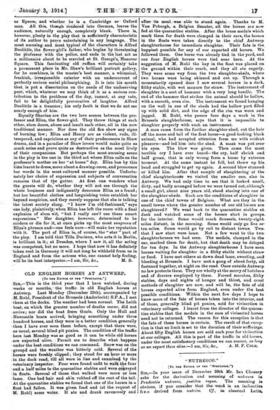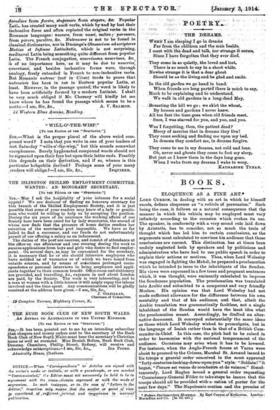"NT.TTRESCO."
(To ram EDITOR or ens ”tirsrmOs.") Sta,—In your issue of December 20th Mr, Ian Chesney asks for the derivation and meaning of nutresco in Prudentia nuiseeeo, jarsfitiO. regno. The meaning is obvious, if you consider that the word, is an inchoative derived from nutsire. Cl, in classical Latin, fiares&;rei from florein,.ituPdlatirie frdm stapite,. SIM Popular Lath, has created Many such Vetlis, ivbicIr brim/ by lost their ibchoative force and' often replaeed'tlie Original verlie 122 the Iloniancie languages: itascare, frettr *mei, llaftre r -pa-resters, from parere, pareitre. i. Ntitreacere is het to be found in illassical dictionaries,' Mir in Diudingthi Giestariam ic4ecriptores Ifedirie et Aflame Latinitrifis; whice is not, surprising, Mediaeval Latin being mitnetiiing gni* different froth popular Latin. The French conjugation, *mar-Mader. /marriages, &c. is of no iMportance here, , as it' may be due to naum-ce, imarthadd, and besides inchoative 'forint; *ere, throngli analogy, hear extended in French to non-inchoidive Verbs. btit Rdmanic *Vireos (we in' eihite). tends' to prove that iutreserls has been in Use in Eastern popular Latin, at least. However, in the 'Parisage quoted; tbe.ward is likely to have been artificially fortned bY a Modern Latinist. I shall be rely much obliged if Mr. Chantey will kindly let me , know where he has found the passage which seems- to bee.
motto.—I ant, Sir, tc., " ' ' A. V. SALMON:
64 Western Elms .Avenite,lleacHrig.



















































 Previous page
Previous page